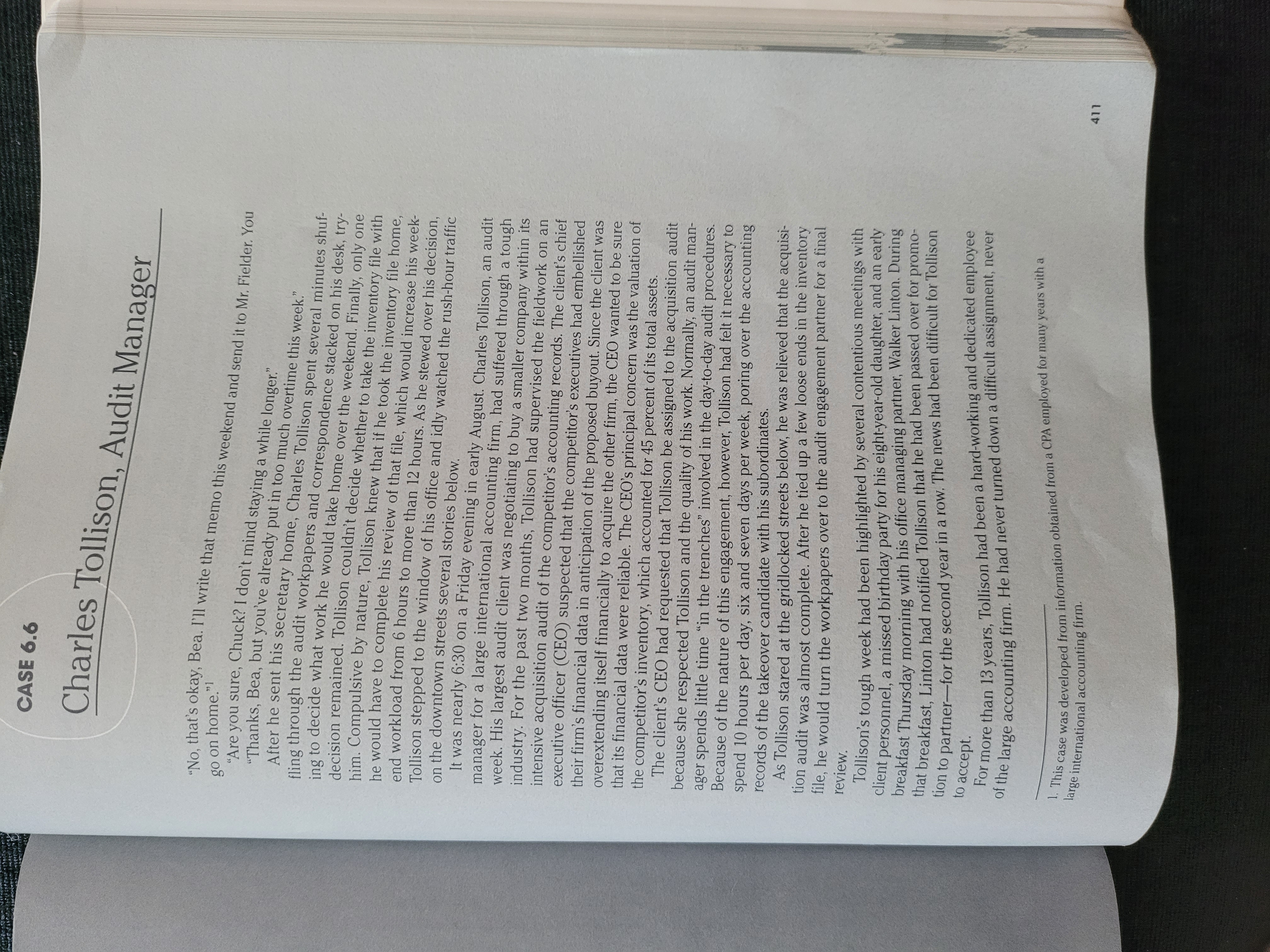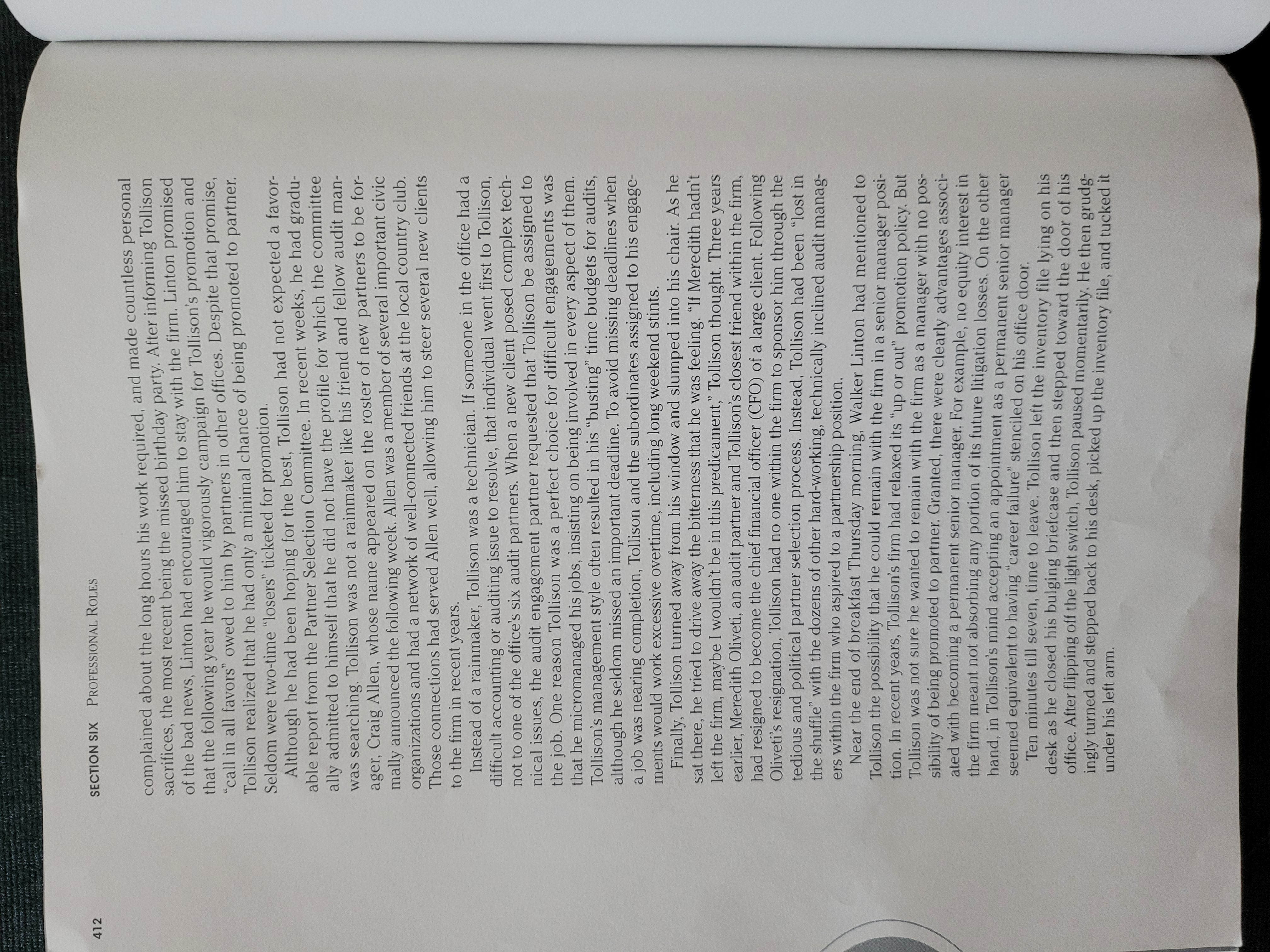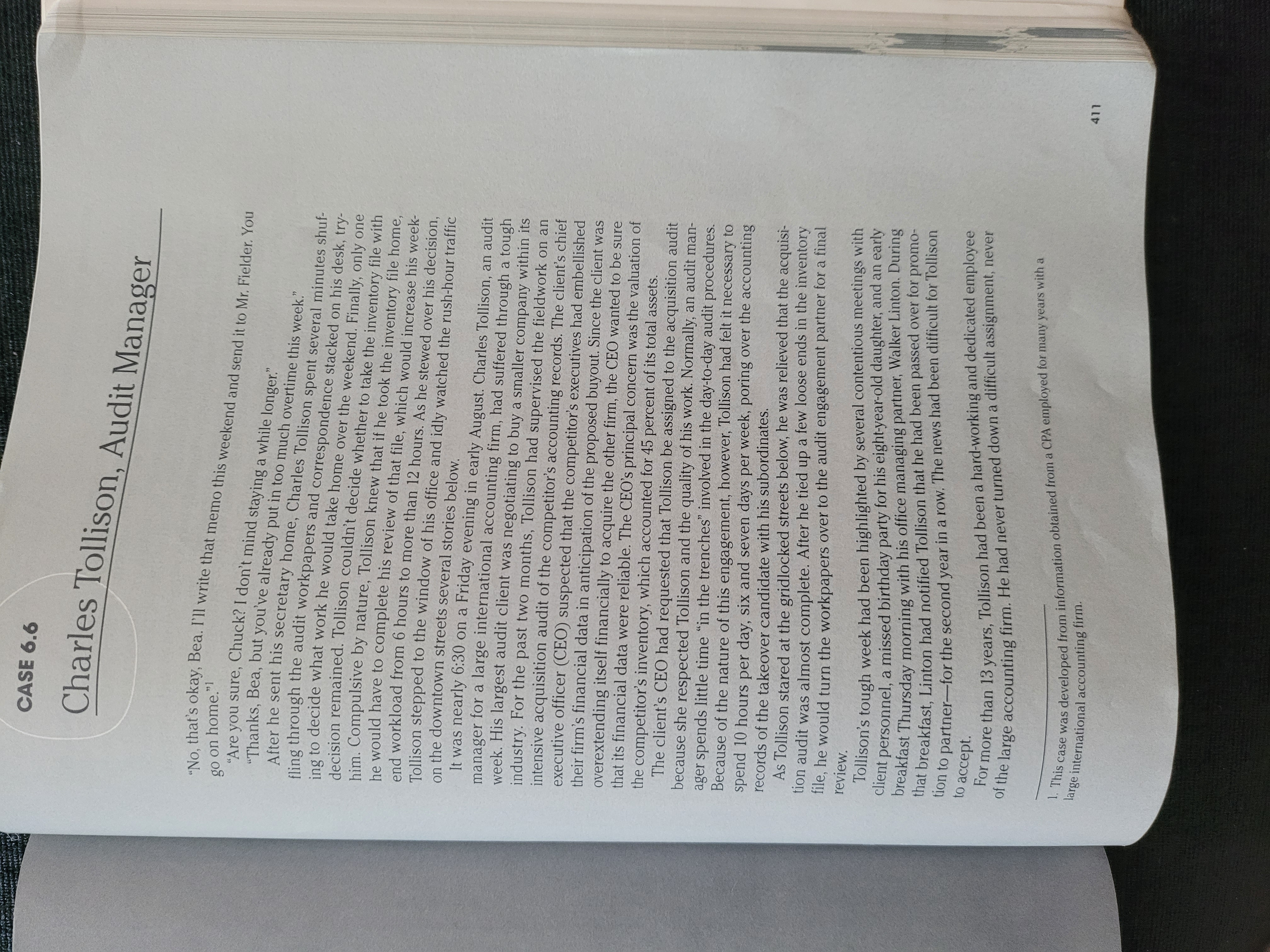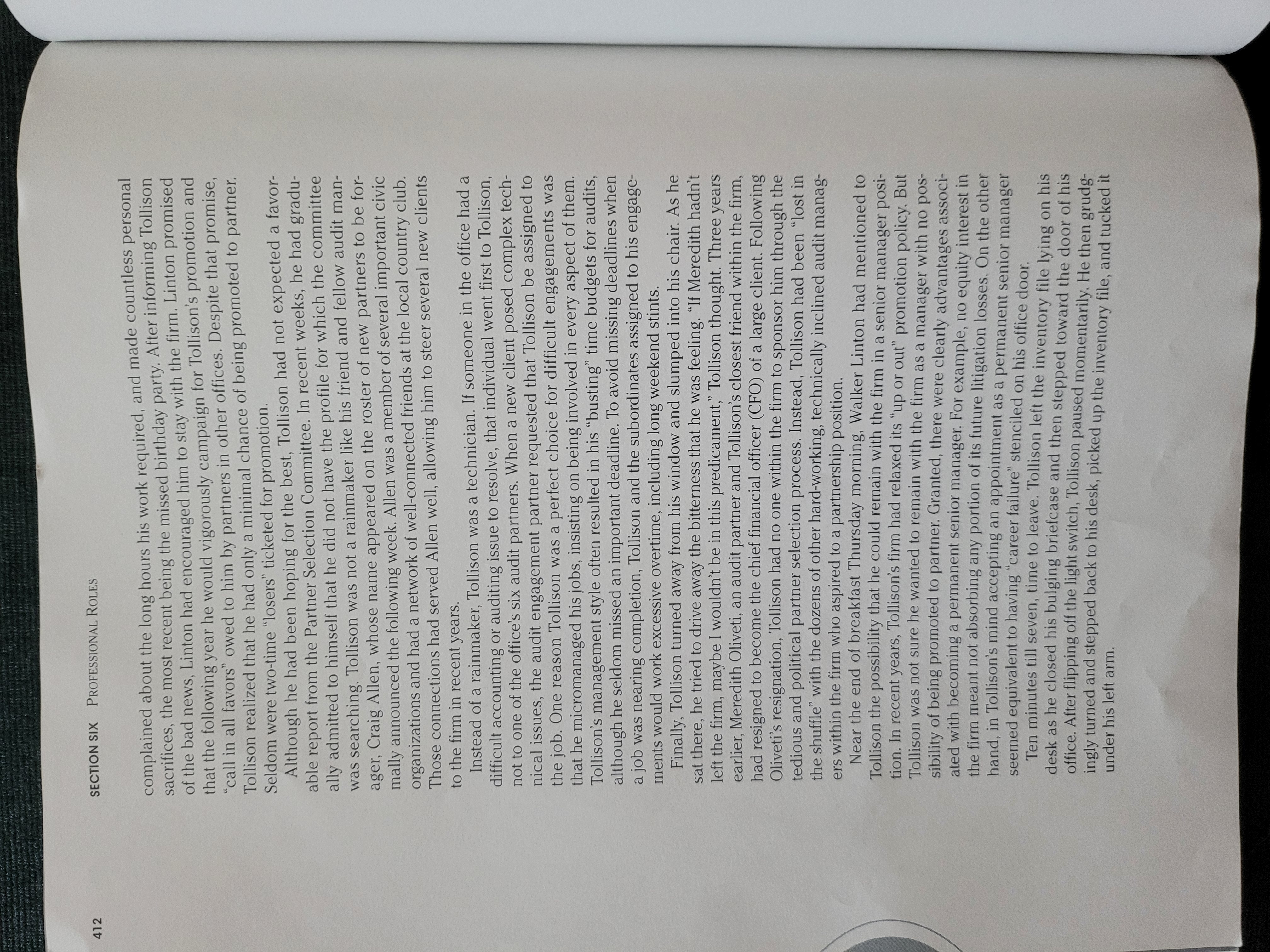

Based on auditing standards, answer the following questions
1. Do you believe Charles Tollison was qualified for a partnership position with his firm? Explain.
2. Did Tollison's firm treat him "fairly"? Why or why not?
3. Identify the criteria you believe large international accounting firms should use when evaluating individuals for promotion to partner. In your opinion, which of these criteria should be most heavily weighted by these firms? Should smaller accounting firms establish different criteria for evaluating individuals for promotion to partner? Explain.
4. Discuss the advantages and disadvantages of the "up or out" promotion policy followed by many accounting firms.
CASE 6.6 Charles Tollison, Audit Manager on home . " "No, that's okay, Bea. I'll write that memo this weekend and send it to Mr. Fielder. You "Are you sure, Chuck? I don't mind staying a while longer." "Thanks, Bea, but you've already put in too much overtime this week." After he sent his secretary home, Charles Tollison spent several minutes shut- fling through the audit workpapers and correspondence stacked on his desk, try- ing to decide what work he would take home over the weekend. Finally, only one decision remained. Tollison couldn't decide whether to take the inventory file with him. Compulsive by nature, Tollison knew that if he took the inventory file home, he would have to complete his review of that file, which would increase his week- end workload from 6 hours to more than 12 hours. As he stewed over his decision, Tollison stepped to the window of his office and idly watched the rush-hour traffic on the downtown streets several stories below. It was nearly 6:30 on a Friday evening in early August. Charles Tollison, an audit manager for a large international accounting firm, had suffered through a tough week. His largest audit client was negotiating to buy a smaller company within its industry. For the past two months, Tollison had supervised the fieldwork on an intensive acquisition audit of the competitor's accounting records. The client's chief executive officer (CEO) suspected that the competitor's executives had embellished their firm's financial data in anticipation of the proposed buyout. Since the client was overextending itself financially to acquire the other firm, the CEO wanted to be sure that its financial data were reliable. The CEO's principal concern was the valuation of the competitor's inventory, which accounted for 45 percent of its total assets. The client's CEO had requested that Tollison be assigned to the acquisition audit because she respected Tollison and the quality of his work. Normally, an audit man- ager spends little time "in the trenches" involved in the day-to-day audit procedures. Because of the nature of this engagement, however, Tollison had felt it necessary to spend 10 hours per day, six and seven days per week, poring over the accounting records of the takeover candidate with his subordinates. As Tollison stared at the gridlocked streets below, he was relieved that the acquisi- tion audit was almost complete. After he tied up a few loose ends in the inventory file, he would turn the workpapers over to the audit engagement partner for a final review. Tollison's tough week had been highlighted by several contentious meetings with client personnel, a missed birthday party for his eight-year-old daughter, and an early breakfast Thursday morning with his office managing partner, Walker Linton. During that breakfast, Linton had notified Tollison that he had been passed over for promo- tion to partner-for the second year in a row. The news had been difficult for Tollison to accept. For more than 13 years, Tollison had been a hard-working and dedicated employee of the large accounting firm. He had never turned down a difficult assignment, never This case was developed from information obtained from a CPA employed for many years with a large international accounting firm. 411412 SECTION SIX PROFESSIONAL ROLES complained about the long hours his work required, and made countless personal sacrifices, the most recent being the missed birthday party. After informing Tollison of the bad news, Linton had encouraged him to stay with the firm. Linton promised that the following year he would vigorously campaign for Tollison's promotion and 'call in all favors" owed to him by partners in other offices. Despite that promise, Tollison realized that he had only a minimal chance of being promoted to partner. Seldom were two-time "losers" ticketed for promotion. Although he had been hoping for the best, Tollison had not expected a favor- able report from the Partner Selection Committee. In recent weeks, he had gradu- ally admitted to himself that he did not have the profile for which the committee was searching. Tollison was not a rainmaker like his friend and fellow audit man- ager, Craig Allen, whose name appeared on the roster of new partners to be for- mally announced the following week. Allen was a member of several important civic organizations and had a network of well-connected friends at the local country club. Those connections had served Allen well, allowing him to steer several new clients to the firm in recent years. Instead of a rainmaker, Tollison was a technician. If someone in the office had a difficult accounting or auditing issue to resolve, that individual went first to Tollison, not to one of the office's six audit partners. When a new client posed complex tech- nical issues, the audit engagement partner requested that Tollison be assigned to the job. One reason Tollison was a perfect choice for difficult engagements was that he micromanaged his jobs, insisting on being involved in every aspect of them. Tollison's management style often resulted in his "busting" time budgets for audits, although he seldom missed an important deadline. To avoid missing deadlines when a job was nearing completion, Tollison and the subordinates assigned to his engage- ments would work excessive overtime, including long weekend stints. Finally, Tollison turned away from his window and slumped into his chair. As he sat there, he tried to drive away the bitterness that he was feeling. "If Meredith hadn't left the firm, maybe I wouldn't be in this predicament," Tollison thought. Three years earlier, Meredith Oliveti, an audit partner and Tollison's closest friend within the firm, had resigned to become the chief financial officer (CFO) of a large client. Following Oliveti's resignation, Tollison had no one within the firm to sponsor him through the tedious and political partner selection process. Instead, Tollison had been "lost in the shuffle" with the dozens of other hard-working, technically inclined audit manag- ers within the firm who aspired to a partnership position. Near the end of breakfast Thursday morning, Walker Linton had mentioned to Tollison the possibility that he could remain with the firm in a senior manager posi- tion. In recent years, Tollison's firm had relaxed its "up or out" promotion policy. But Tollison was not sure he wanted to remain with the firm as a manager with no pos- sibility of being promoted to partner. Granted, there were clearly advantages associ- ated with becoming a permanent senior manager. For example, no equity interest in the firm meant not absorbing any portion of its future litigation losses. On the other hand, in Tollison's mind accepting an appointment as a permanent senior manager seemed equivalent to having "career failure" stenciled on his office door. Ten minutes till seven, time to leave. Tollison left the inventory file lying on his desk as he closed his bulging briefcase and then stepped toward the door of his office. After flipping off the light switch, Tollison paused momentarily. He then grudg ingly turned and stepped back to his desk, picked up the inventory file, and tucked it under his left arm










